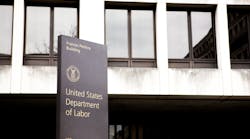Any union official will tell you that the best way for an employer to avoid being organized is simple: Treat your employees well and pay them fairly. Union organizing efforts can find no purchase where the seeds of grievance and distrust are not sown.
The most recently available reports put private sector union representation at just 6.7% of the national workforce. However, unions keep trying to organize new employers in almost every industry segment, efforts that have achieved varying levels of success. With the active help of the Obama Administration, and sympathetic legislators in many states and cities, unions have gained ground in some areas—including logistics.
Readers of this column are aware of many of these changes. For example, attacks on professional drivers' independent contractor status yielded positive results for unions in different parts of the country, such as helping the Teamsters' advance their ambitious goal of organizing all drayage drivers at West Coast ports.
Federal level help includes a recent National Labor Relations Board (NLRB) declaration that the votes of temporary workers employed by an outside staffing firm can be counted in an organizing election along with the votes of regular employees. (On a more hopeful note, the NLRB persuader rule requiring employers to reveal details about their arrangements with labor consultants and attorneys was stayed by a federal court pending review.)
When it comes to preparing for union organizing, the biggest change for employers is the NLRB ambush election rule that went into effect in April 2015. Because of it, the average time between a petition being filed by the union to hold an organizing election and the vote has shrunk from 38 to 24 days, giving employers less time to mount a campaign against the union.
Employers should prepare well before the union files an election petition, including employers who don't believe they're vulnerable, warns attorney Hugh F. Murray III of the law firm McCarter & English.
He advises taking the following steps:
- Develop a chain of responsibility within the organization to deal with an NLRB petition and enable a timely response.
- Consider the alternatives of handling a campaign in-house or using a capable outside firm or agency that would fit the employer's employee relations philosophy.
- Identify major issues that may arise in representation proceedings, including the supervisory status of employees and scope of putative bargaining units.
- Review wages, benefits and employee policies to be aware of any vulnerabilities that a union may capitalize on. If feasible, plan in advance organizational and/or benefit changes, and maintain a detailed record of those potential changes.
"Counsel experienced in union organizing efforts—working together with an in-house labor team—could help frame in advance a sound strategy for responding to any union organizing drive," Murray observes. "Because all legal issues related to the representation petition must be raised in writing within seven days of receiving a petition or are waived, labor counsel should be available and ready to act as soon as a petition is filed."
While unions have filed election petitions in greater numbers since the ambush rule, their success rate has stayed about the same because many employers are measuring how vulnerable they are and are taking action, notes attorney Alan Kaplan of the law firm Masuda Funai Eifert & Mitchell.
"Companies compare their wage rates to those of other companies in the same geographical area or industrial park, draft policies, train supervisors and implement procedures to create and ensure an issue-free workplace," Kaplan stresses. Companies that can successfully pre-empt potential grievances don't need to worry about their employees turning to a union for help.
David Sparkman is founding editor of ACWI Advance, the newsletter of the American Chain of Warehouses Inc., as well as a member of the MH&L Editorial Advisory Board.



